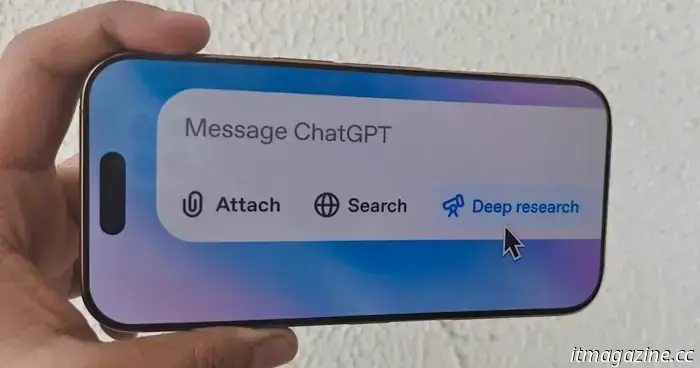
Google Gemini ranks among the top three AI services, boasting 350 million monthly users.
Andy Boxall / Digital Trends
Insights into Google’s Gemini user demographic have emerged in a low-key manner, revealing that the AI chatbot has attracted around 350 million monthly active users and 35 million daily active users as of March 2025.
The Information sourced court documents from a current antitrust lawsuit involving the company, which disclosed that the Gemini chatbot experienced user growth from 9 million daily users or 90 million monthly in October 2024, to about 35 million daily users by early 2025.
Google Gemini has garnered interest among AI enthusiasts; however, it lags behind leading AI platforms like OpenAI’s ChatGPT and Meta AI services in user numbers. Analysts estimate that ChatGPT has surpassed 600 million monthly active users and 160 million daily users, though these statistics remain unverified by OpenAI. The last official update from OpenAI CEO, Sam Altman, indicated 500 million monthly active users as of early April. Additionally, during an April 11 conversation with a TED interviewer, Altman suggested that OpenAI might have doubled its user base, reaching one billion weekly active users, as noted by PCMag.
Conversely, Meta AI reported roughly 700 million monthly active users as of January 2025, an increase from nearly 500 million monthly users in September 2024.
While all AI services are witnessing substantial growth, analysts suggest that Google has a distinctive strategy in deploying its Gemini technology compared to its rivals. Many AI tools necessitate user engagement through web access or app downloads. In contrast, Google has integrated Gemini into its existing ecosystem, ensuring user access through platforms like Google Workspace apps and the Chrome browser, as well as partnerships with Samsung to feature Gemini on Galaxy smartphones and collaborations with computing OEMs to produce Chromebooks with Gemini natively running, as Gadgets Review reported.
OpenAI’s ChatGPT has capitalized on several viral events, especially following the recent launch of the GPT-4o image generator model, leading to a significant increase in user registrations. Meta AI benefited from having an existing user base across platforms such as Facebook, Instagram, and WhatsApp.
Though Google has continuously updated its Gemini chatbot, much of the development has oriented towards productivity. The company has introduced features like Deep Research, which explains the reasoning behind responses to inquiries, and AI Mode for Google Search, which provides a more AI-enhanced search experience.
Fionna Agomuoh is a Computing Writer at Digital Trends, covering various topics within the computing sector.
Google is set to enhance its Gemini AI with precise news
On Wednesday, Google announced an agreement with the Associated Press to create "a feed of real-time information" for Gemini. Details about the initiative are sparse, but it seems it may partially resemble the features of Perplexity AI or ChatGPT Search. There is no current information on when the feed will be made available to users. "As we develop new AI offerings and products, we’re pinpointing specific types of information and data that can improve our products and services for everyone," stated Jaffer Zaidi, Google’s VP of global news partnerships, in the announcement. "This [new feed] will be especially beneficial for users seeking current information."
Google TV will soon benefit from Gemini’s AI capabilities
Beginning later in 2025, users will finally achieve results by speaking to their TV, thanks to a new Google initiative revealed Monday ahead of CES 2025. The company intends to incorporate its Gemini AI models into the Google TV interface to "make interacting with your TV more intuitive and helpful." Google claims that this will streamline media searches significantly, allowing users to ask questions about topics like travel, health, space, history, and more, with video results for added context, as per the company’s blog post. Google previously experienced a major drop in market value after its Gemini prototype, Bard, faltered during its first public demo in 2023. The company also suspended the AI's image-generation feature in early 2024 after it generated racially insensitive images of people of color.
Google’s new Gemini 2.0 AI model is set to be widely implemented
Less than a year after launching Gemini 1.5, Google’s DeepMind division introduced Gemini 2.0 on Wednesday. This next-generation model features native image and audio output and "will allow us to create new AI agents that bring us closer to our vision of a universal assistant," the company mentioned in its announcement blog post. As of Wednesday, Gemini 2.0 is accessible at all subscription levels, including for free. As Google's flagship AI model, it will start to power AI features throughout the company's ecosystem in the upcoming months. Similar to OpenAI's o1 model, the initial version of Gemini 2.0 is not the complete release but rather a smaller, limited "experimental preview" that will receive updates in future Google Gemini versions.





Other articles
.jpg) 3 excellent free films to watch this weekend (April 25-27)
Watch these free movies from April 25-27: a crime epic by Martin Scorsese, a timeless buddy comedy, and a science fiction monster flick.
3 excellent free films to watch this weekend (April 25-27)
Watch these free movies from April 25-27: a crime epic by Martin Scorsese, a timeless buddy comedy, and a science fiction monster flick.
 ChatGPT’s impressive Deep Research has been simplified and is now available for free to everyone.
One of the top features of ChatGPT is Deep Research, although it previously required a subscription. OpenAI has now introduced a more streamlined version and made it available to free users.
ChatGPT’s impressive Deep Research has been simplified and is now available for free to everyone.
One of the top features of ChatGPT is Deep Research, although it previously required a subscription. OpenAI has now introduced a more streamlined version and made it available to free users.
.jpg) Three overlooked Netflix films to check out this weekend (April 25–27)
Looking for hidden gems? Netflix offers numerous underrated films, featuring a historical drama, a touching international selection, and a distinct sports movie.
Three overlooked Netflix films to check out this weekend (April 25–27)
Looking for hidden gems? Netflix offers numerous underrated films, featuring a historical drama, a touching international selection, and a distinct sports movie.
 OnePlus 13T: All the essential information you need.
The OnePlus 13T has been officially launched in China, and it is impressively powerful given its dimensions.
OnePlus 13T: All the essential information you need.
The OnePlus 13T has been officially launched in China, and it is impressively powerful given its dimensions.
 Sydney Sweeney is set to appear in the Split Fiction film.
The live-action version of the popular video game Split Fiction features Sydney Sweeney in a leading role.
Sydney Sweeney is set to appear in the Split Fiction film.
The live-action version of the popular video game Split Fiction features Sydney Sweeney in a leading role.
.jpg) Three overlooked Netflix series to check out this weekend (April 25-27)
These Netflix shows serve as a reminder of how much excellent content is frequently hidden by the algorithm.
Three overlooked Netflix series to check out this weekend (April 25-27)
These Netflix shows serve as a reminder of how much excellent content is frequently hidden by the algorithm.
Google Gemini ranks among the top three AI services, boasting 350 million monthly users.
Although there has been substantial growth, Google's Gemini chatbot seems to trail behind competitors such as OpenAI's ChatGPT and Meta AI regarding the number of monthly active users.
